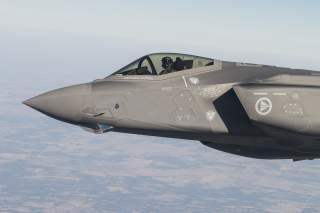Coming Soon: Japan and South Korea Armed to The Teeth with New Weapons
But what will Trump sell them?
President Trump earlier this week spoke with South Korean President Moon Jae-In to explore ways to strengthen “joint military capabilities” in the face of North Korea's “destabilizing provocation,” according to a White House statement.
Defense Secretary Jim Mattis, meanwhile, assured Japanese Minister of Defense Itsunori Onodera of the longstanding U.S. commitment to defend Japan and stated the United States will “work with Japan to enhance its ballistic missile defense capabilities.”
One takeaway from these exchanges is that the United States is prepared to offer these key allies advanced weaponry, beyond what it already sells them under the Pentagon’s foreign military sales program. The White House said Trump agreed “in principle” to lift restrictions on missile payloads that South Korea is able to acquire from the United States. Trump also offered “conceptual approval” for the purchase of “many billions of dollars’” worth of military weapons and equipment from the United States.
The president tweeted Tuesday: "I am allowing Japan & South Korea to buy a substantially increased amount of highly sophisticated military equipment from the United States.”
Neither the White House nor the Pentagon would provide details, leaving experts to speculate on what specific new hardware the United States would provide to its allies to help counter or deter Pyongyang. Both nations already buy advanced U.S. weaponry and any new deals would not happen overnight. Foreign military sales involve drawn-out processes that can take years. They typically entail complex negotiations not only between nations but within the U.S. government, with the Pentagon, the State Department and Congress all playing central roles.
The three-star U.S. Army general who oversees foreign military sales said security cooperation efforts with the Republic of Korea and Japan are “already strong” but that the North Korea threat raises the stakes.
“We continue to work with them to find solutions as best we can to address this common challenge,” said Lt. Gen. Charles Hooper, director of the Defense Security Cooperation Agency.
“Our commitment to our Japanese and South Korean allies has been steadfast,” Hooper said Wednesday at a defense industry conference in Washington, D.C.
He declined to comment on Trump’s statements about new arms deals, but said the Pentagon is “working very closely with our South Korean allies to assess their immediate requirements. … We recognize the severity and the seriousness of the current challenges. We’ll work very closely with them to meet their requirements and address our mutual interests.”
Claims by North Korea to have detonated a hydrogen bomb — a weapon that in the future could be miniaturized and launched atop an intercontinental ballistic missile — caught the world by surprise. The dramatic escalation of North Korea’s nuclear program should drive U.S. weapons sales in Asia, but analysts said many questions remain.
Japan already spends billions of dollars on U.S.-made missile-warning radars, ballistic missile defense warships and Patriot batteries. “They are going to have greater requirements for that capability,” Avascent analyst Steve Ganyard wrote in a white paper. Japan’s politicians “react to North Korean missiles in a way that says that ‘we’ll protect the people and build a missile shield over large population centers like Tokyo’ because they have to address public fears,” Ganyard commented.
North Korea’s missile development program with nuclear delivery capability threatens Northeast Asia as well as the United States, he added, “but so far our policies have been ineffective in halting it and that North Korean effort is going to continue on its technological march. The ability to directly threaten Tokyo with a nuclear weapon is generating a lot of domestic political concern.“
Roman Schweizer, defense industry analyst at Cowen Research, predicts Japan will seek more U.S. arms. “We see Japan's high-end shopping list as representative of the global demand for U.S. foreign military sales programs,” he told industry investors in an email. “With continued provocations from North Korea, it's no surprise that Japan’s Ministry of Defense request heavily favors missile defense systems.” The list includes the U.S. Navy’s Aegis air defense system and missile interceptors, Patriot systems and radar upgrades.
Japan also is considering acquiring the THAAD (terminal high-altitude area defense) missile system, as well as advanced tactical fighters and helicopters. “We've also seen multiple reports that Japan is considering acquiring Tomahawk strike missiles,” noted Schweizer. “Acquiring an offensive missile system would be a major decision for Japan and would ratchet up pressure on both North Korea and China.”
South Korea has acquired THAAD batteries from the United States although it also has developed its own missiles and launchers. The crisis triggered by North Korea’s nuclear weapon advances accelerated the deployment of THAAD.
Mattis this week spoke with Republic of Korea Minister of National Defense Song Young-moo to discuss North Korea's nuclear test on Sept. 2. Mattis “assured Minister Song that the United States remains ironclad in its commitment to the defense of the ROK,” Pentagon spokeswoman Dana White said in a readout. “He further emphasized that any threat to the United States, its territories, or its allies will be met with a massive, effective, and overwhelming military response.” Mattis and Song also discussed “avenues for improving bilateral, trilateral, and regional defense cooperation in light of the threat posed by North Korea and to maintain peace and stability in Northeast Asia and the broader Asia-Pacific region.”
Sandra Erwin is a national security and defense reporter for RealClearDefense, where this first appeared. She can be reached at [email protected]. Follow Sandra on Twitter @Sandra_I_Erwin.
Image: Creative Commons.

